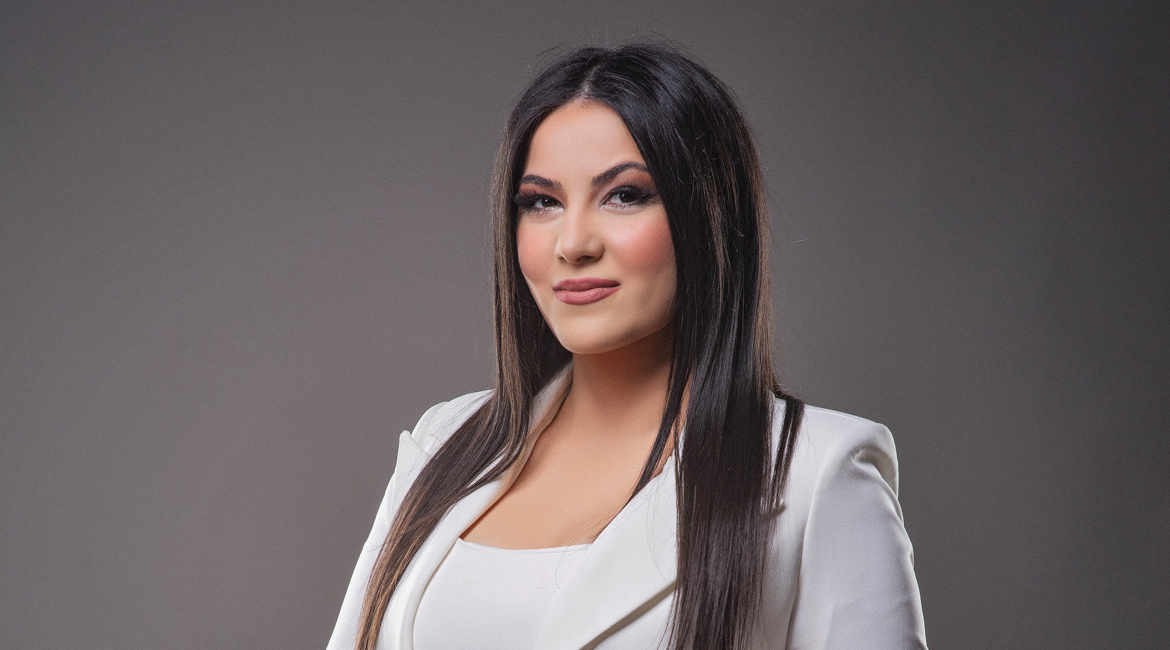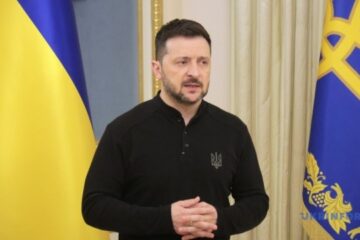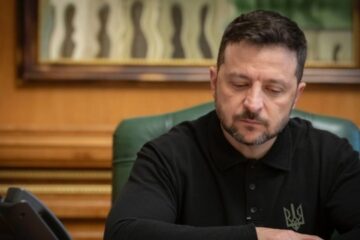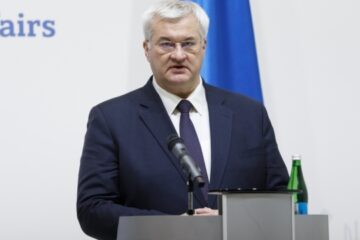When it comes to Serbia, Ukrainian media mainly mention the statements by President Aleksandar Vucic. Little do Ukrainians know about the moods in the largest country in the Western Balkans, what its citizens discuss, and how they learn about our opposition to Russian aggression.
Ukrinform decided to correct this and spoke with Madam Sahrimanjan-Obradovic, a researcher at the Center for Strategic Analysis, who publishes materials in the media and acts as a public commentator on Serbian television. We talked about the Serbs’ vision of the war against Ukraine, the impact of Russian propaganda on their society, and the European integration of the country, which has opened 22 out of 35 chapters in the negotiations for accession to the European Union.
RUSSIAN DISINFORMATION SHAPES INFORMATION, BUT SERBS STILL DON’T APPROVE CIVILIAN CASUALTIES IN UKRAINE
– I am glad we can use our conversation to learn more about Serbia. For example, the outbreak of such powerful civil protests has truly amazed us. So, what worries Serbs today?
– The protests occurred because of a terrible tragedy where concrete construction killed 16 people at a railway station in Novi Sad. It triggered various social groups, including part of the student population and those in higher education.
They do not have economic reasons: Serbia has stable growth between 3,5%-4% and employment is at a record high
It is very hard even for me to understand the clear vision of protestors. They request government accountability, while over 100 have been prosecuted together with the minister of transport and infrastructure.
It is very hard to trace protestors’ requests and to do checks and balances. They became anti-government. We can see there Russia’s banner, Wagner’s one with Christ on a red background and physical attacks on people who brought the EU flag. Protestors declared they are against corruption, but they are not pro-EU. Everybody knows that without the European Union, there is no fight against corruption.
It is still not clear what kind of political shape protest will bring in the future. A brief analysis tells us that only small parts of society are engaged. Protests are vocal and viral, but they are far away from a clear political outcome.
Serbia formed a new government to deal with confidence in the institution and establish stronger public sector’s accountability of the public sector. Everything else happening now in Serbia has nothing to do with citizen requests. It is becoming a clear political struggle.
– Do Serbs keep an eye on Russia’s war against Ukraine? Does news from Ukraine reach the top headlines of your media?
– The aggression against Ukraine dominated until last summer. Shamefully, in most cases, Russian disinformation and manipulations are the ones which are shaping information space regarding the war against Ukraine. The total dominance of pro-Russian opinion makers and reporting is challenged but not on the proper level. The majority of the population still does not see the full scale of Russian crimes and responsibility for the war.
On the one hand, Serbia voted in all major international platforms in favour of Ukraine, and Serbian-produced ammunition found its way to Ukraine’s army. On the other hand, thanks to the media reporting, people still think that NATO and the EU are responsible for war.
Serbian people are hit by civilian casualties and do not approve that.
A lot has to be done on objective media reporting. Some media started to change their shifts in favour of Ukraine. That is encouraging. Few media report very clearly about the situation, but in practice, these are well-known tactics of information shaping and laundering in favour of Russia. Some media outlets visited Ukraine in the last 3 years and reported directly.
In my view, the biggest obstacle is the informational geopolitical battlegrounds made on that topic, so there are more comments than reports when the topic of Ukraine is on the table.
– Unfortunately, the Western Balkans have also had a similar experience of hostilities. What touches Serbs the most when it comes to news from Ukraine? How, in your opinion, could our state build communication with Serbia?
For a long time, Serbs did not know much about Ukraine. Culture, tradition and religion were presented as part of the “Russian world”. Strong Russian influence impacted our relations with Ukraine, Georgia, the Baltics and Armenia. I will give you one fact. Last year, for the first time, our Minister of Foreign Affairs visited the Baltics. The same goes for Serbia’s participation in the Three Seas Initiative. Now, those shifts are occurring.
Western Balkans is a fertile ground for ethnical tensions based on the wrong historical interpretations. With war and tragedy, people share experiences and emotions with civilian casualties and the destruction of cities and energy infrastructure in Ukraine.
In the diplomatic view, two Presidents, Vucic and Zelenskyy, have open discussions and conversations with mutual respect. Serbian President Vucic shared posts on his social networks with updates on talks with Mr Zelenskyy. The First Lady of Ukraine visited Serbia, and the First Lady of Serbia engaged in humanitarian activities to help Ukraine children and also visited Kyiv.
Serbia is thankful to Ukraine for not recognizing Kosovo. I am one of the founders of the Ukraine-Western Balkans Cooperation Network, founded in Sarajevo in 2022 to promote comprehensive economic, cultural and technological collaboration. Serbia has, again, an ambassador in Kyiv, which is an operational sign for further development of relations.
So far, Serbia provided Ukraine with more than 50 million euros in support. Some estimates Serbia is the biggest donor to Ukraine from the Western Balkans. So, Ukraine state is properly communicating the situation with Serbia. However, there is a lot of potential for economic collaboration once the aggression is over.
I think that media partnerships between Serbian and Ukrainian media houses can contribute a lot, maybe through the organization of visits, exchange of reports, and fact-based visits for opinion makers can contribute more. Official collaboration for the exchange of materials can challenge Russian-dominant content and materials.
RUSSIAN MEASURES HAVE NEVER BEEN CHALLENGED IN SERBIA
– Russian media constantly emphasize the sentiment of Serbs towards Russia. How widespread is it really in your society? Serbia has not banned Russia Today either. To what extent does their perspective on events in Ukraine, such as accusing us or Europe of igniting the war, prevail among Serbs?
– Serbs’ positive sentiments towards Russia are the result of 30 years of deliberate pro-Russian propaganda. Russia – or better Putin – is like Coca-Cola. Their investment in influence operations is as huge and constant as any other marketing activity. Russian active measures have never been challenged in Serbia.
RT has a very small reach, but its materials and products find their way to mainstream media without attribution to RT. The information space in Serbia consists of a huge amount of pro-Russian materials, such as short videos without authors or creator signatures. They are edited and translated into Serbian and then placed into the information sphere. Preparing those materials is, in many cases, organized. Also, pro-Russian opinion makers through RT have access to propaganda message boxes. RT’s role is in defining and placing of narrative.
Banning RT will be a strong political message regarding tolerance for Russian propaganda. Its real impact will be countering Russian influence operations, cutting them access to mainstream media, and labelling its materials on social networks. It is a very complex but urgently needed measure. RT acting in Serbia as “legitimate” media which should not be the case.
After the NATO bombing, support for joining the Alliance in Serbia was 26%, then it was 6%. Today it is 10%. The goal of Russia is to prevent membership of Serbia to the EU, which means it is using anti-NATO sentiment to achieve anti-EU goals.
Aggression against Ukraine is used to justify that stance with the promotion of Russian geopolitical views, in that context, aggression against Ukraine is a supportive vector for already existing operations. In that sense, we should look at Sputnik and RT as knowledge bases for anti-EU information activities which covertly and overtly participate in anti-western activities.

FOREIGN FIGHTERS WILL BECOME A HOT TOPIC FOR BELGRADE AND MOSCOW
– The Kremlin has tried to recruit Serbs to fight against Ukraine. Unsuccessful, but I still want to ask how the public perceives people who go to Russia’s aggressive war. Does the state persecute them for the mercenary?
– Serbia has very rigorous laws to prevent its citizens from becoming foreign fighters in Russian forces or anywhere else. As far as it is known publicly, the security system is actively working to dismantle and prosecute recruiting activities. People who fought and still fighting for Russia are subject to prosecution.
Because the criminal regime from Moscow grants them citizenship and basic incentives to stay in Russia, so in that way, they avoid criminal prosecution.
I think this will become a hot topic for Belgrade and Moscow sooner or later because those foreign fighters are advocates against the Government in Belgrade. They use Telegram and social networks as recruiters, opinion makers or influencers. It depends on which role they have, but most of them die in Putin’s meat-grinding machine.
It is a very small number of people who go to die for Putin from Serbia, but the problem is a radicalization process which can result in violent extremism domestically. Preventive measures are directed against recruiting but pro-Russian propaganda is the basis for this process. If countries counter ISIS propaganda same should be done with Russia as well. It is very important that Serbia and Ukraine exchange information through international police cooperation.
RUSSIANS IN SERBIA AVOID SPEAKING ON POLITICAL TOPICS
– Serbia has welcomed an enormous number of Russian citizens, some of whom were fleeing mobilization for the war. 150 thousand migrants, right? Do these Russians spread their vision of Ukraine? Are they becoming a political factor in your country?
– Russians who migrated to Serbia are strongly against aggression on Ukraine. They avoid speaking on political topics. Those people are, in most cases, in transition from Serbia to the EU.
They are not politically organized, but they bring increasing prices for flat and office rent.
When Navalny died, on the main square in Belgrade Russian laid flowers and candles. Unfortunately, those people do not speak publicly for the media. If they start to speak, Serbian people will realize the scale of the destructive actions of Putin for Russia itself.
Ordinary Russians, as far as I know, do not see Ukraine as part of Russia they will always refer to it “as close neighbours” when you ask those who are now living in Serbia. If they start to speak to the Serbian public, I think people will have a lot to learn about Russia instead of propaganda views.
SERBS UNDERSTAND THE BENEFITS OF EU MEMBERSHIP
– Serbia began the accession negotiations with the EU in 2015. Ukraine is still waiting to open the first cluster of EU legislation. How has this process been going in your country, what impediments from Brussels and the member states do you face, and have Serbs preserved their Euro-optimism?
– Around 46% of people are for EU membership. That is not a small number if we see the quantity of EU-sceptical content in media. For the first time in decades, this number is less than 50%.
Our economy is completely attached to the EU, employment depends on the EU market, and investments come from the EU. In case the PRC stops the investment in Serbia, nobody will be hit. If Germany stops, many will be.
Serbia has its goals for reforms. In the economy, we have achieved great results. The same is true with fiscal consolidation, but reforms like the rule of law are to be achieved.
Serbia faces difficulties with some member states. On the other hand, France strongly supports EU integrations.
In practice, people understand the benefits of the EU membership, but the unresolved status of Kosovo is still an obstacle. Euro-optimism is a fact of perception, but real benefits are the situation on the ground, which exists in Serbia.
– How does the Serbian public react to President Vucic’s urge to visit Moscow on May 9, which might violate the criteria for joining the EU?
– I do not believe a possible trip to Moscow will violate the criteria for joining the EU. It will provide some EU countries with more arguments for slowing the integration process but will not stop it. This visit must be watched as diplomatic action, not only as a concession for Russia.
We have an unresolved status of sanctioned Naftna Industrija Srbije. The Russian side does not want to help Serbia resolve this problem. I think Serbian leadership considered all aspects of that trip and already communicated it with major Western nations. In these circumstances, it will be hard to estimate public reaction and its impact.
We have a major shift of public opinion, whose priority is not relations with Moscow anymore, but people caring for quality of life. The good news is that the Serbian military will not attend because of the risk of ruining interoperability capacities based on cooperation with Western partners.
After the topic of May 9 came to the public several times, Russia’s MFA has softly pressured with manipulative statements about the attendance of the Serbian President.
SERBIA SHOULD SHIFT MORE TOWARDS THE WEST
– Ukrainians used to think they could be in Europe and simultaneously be friends with Russia back in the day. However, time and Russian aggression prove them wrong. Do Serbs ask themselves that it is impossible to stay at a crossroads forever?
– We must open honest public discussion in Serbia about the effectiveness of the current foreign policy orientation – the four pillars (the EU is the key pillar, with Russia, China, and the US as the other three – ed.).
That is one of the reasons why Russia is investing so many resources in anti-EU propaganda. We never had an open debate on Serbian neutrality and the four pillars of foreign policy. It was brought to Serbia’s politics after the assassination of Prime Minister Zoran Đinđić. The new Serbian government has to produce a strategy of foreign policy which should provide answers according to contemporary processes in the world and region.
One parameter is that China and Russia are limited in Serbia and they cannot be providers of security and economic development. According to that Serbia should shift more towards the West based on the proper strategy which will clearly address our position.
Ivan Kosiakin, Kyiv
Photos: PDI, czsa.org
Source: Biljana Sahrimanjan-Obradovic, analyst with Belgrade-based Center for Strategic Analysis




